Maximizing Efficiency: Your Guide to Choosing the Best Heat Pump Hot Water System
Looking for an energy-efficient way to heat your water at home? A heat pump hot water system may be your answer, offering significant energy savings and a greener footprint compared to traditional systems. This guide cuts through the complexity, helping you navigate the choices and considerations in selecting, installing, and maintaining a heat pump hot water system, suited to your home’s unique demands.
Key Takeaways
-
Heat pump hot water systems are energy-efficient, utilizing heat transfer instead of generating heat directly through electricity, thus offering energy and cost savings along with a reduction in CO2 emissions.
-
When choosing the right heat pump hot water system, factors like system type (integrated vs. split), appropriate sizing, noise levels, and installation considerations including professional setup and regular maintenance are essential for optimal efficiency and comfort.
-
Financial incentives, such as government rebates and long-term energy cost savings, make heat pump hot water systems economically advantageous despite higher initial costs, and integrating with renewable energy sources can further enhance their efficiency and reduce operating costs.
Understanding Heat Pump Hot Water Systems
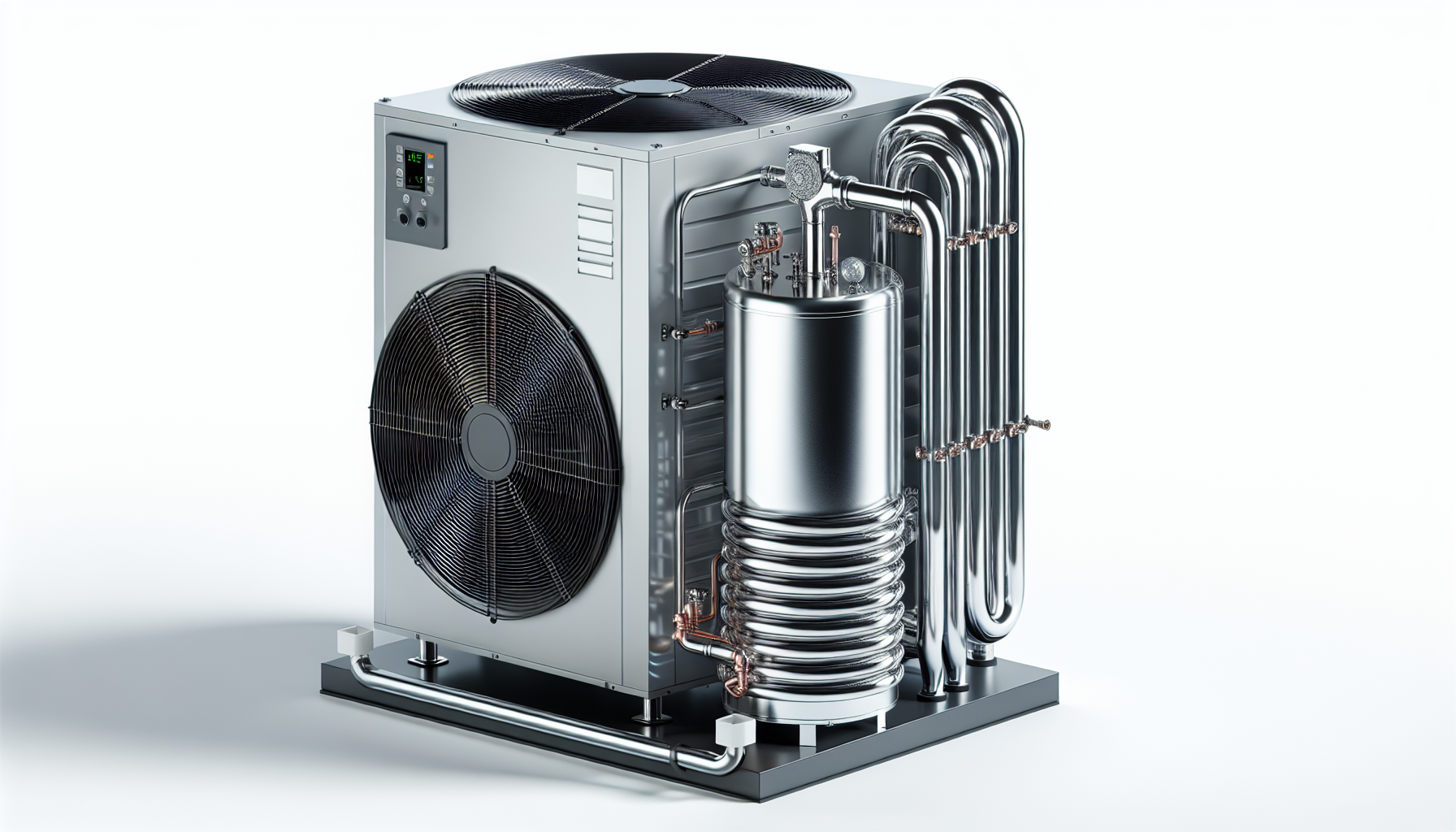
Heat pump hot water systems have emerged as a revolutionary tool in the quest for energy efficiency. These systems operate by transferring heat from the air or ground to warm water, instead of generating heat directly through electricity. It’s akin to how a refrigerator pulls heat from its interior but in reverse. Heat pump systems, due to this method, attain significantly superior energy efficiency compared to conventional electric storage water heaters. You can think of them as a threefold solution - they offer energy and cost savings, reduce CO2 emissions, and provide an endless supply of hot water.
But, as with any technology, heat pump hot water systems have their optimal operating conditions. They work best when:
-
The ambient air temperature is high as they draw heat from the surrounding air
-
The reheat rate, influenced by ambient air temperature, slows down in colder conditions
-
The system may use an electric boost element to decrease reheat times in low temperatures, but this increases operating costs, impacting the overall efficiency of the heat pump technology.
Components of a Heat Pump System
Understanding the key components of the system is fundamental to grasping how heat pump hot water systems function. The primary elements include:
-
The evaporator
-
The fan
-
The compressor
-
The refrigerant piping
These components work together to draw heat directly from the ambient air.
The components of a refrigeration system include:
-
Evaporator: Absorbs heat from the environment before it is moved and amplified within the system.
-
Compressor: Circulates the refrigerant through a refrigeration cycle, playing a critical role in the heating and heat transfer processes within the system.
-
Fan: Assists by drawing in ambient air and passing it over the evaporator coil to extract heat.
These components work together to create a cooling effect in the system.
Being familiar with these components and their functions can enlighten users about the efficiency of heat pump hot water systems in heating water.
How Heat Pumps Work
Heat pumps operate by:
-
Extracting heat from the ambient air
-
Using the extracted heat to elevate the temperature of water held in a reservoir
-
Operating in a manner akin to that of a reverse refrigerator
Even in cooler conditions, the heat pump can efficiently extract heat from the air, using minimal energy to transfer heat to a different location.
The process encompasses the refrigerant absorbing surrounding heat and subsequently transferring it to the water in the storage tank via the system’s condenser and heat exchanger. This process’s efficiency is significantly higher than traditional electric water heaters, consuming notably less electricity, and potentially as little as 30% of the energy required by a conventional system.
Such energy efficiency is at the heart of the long-term savings promise held by heat pump hot water systems.
Choosing the Right Heat Pump Hot Water System
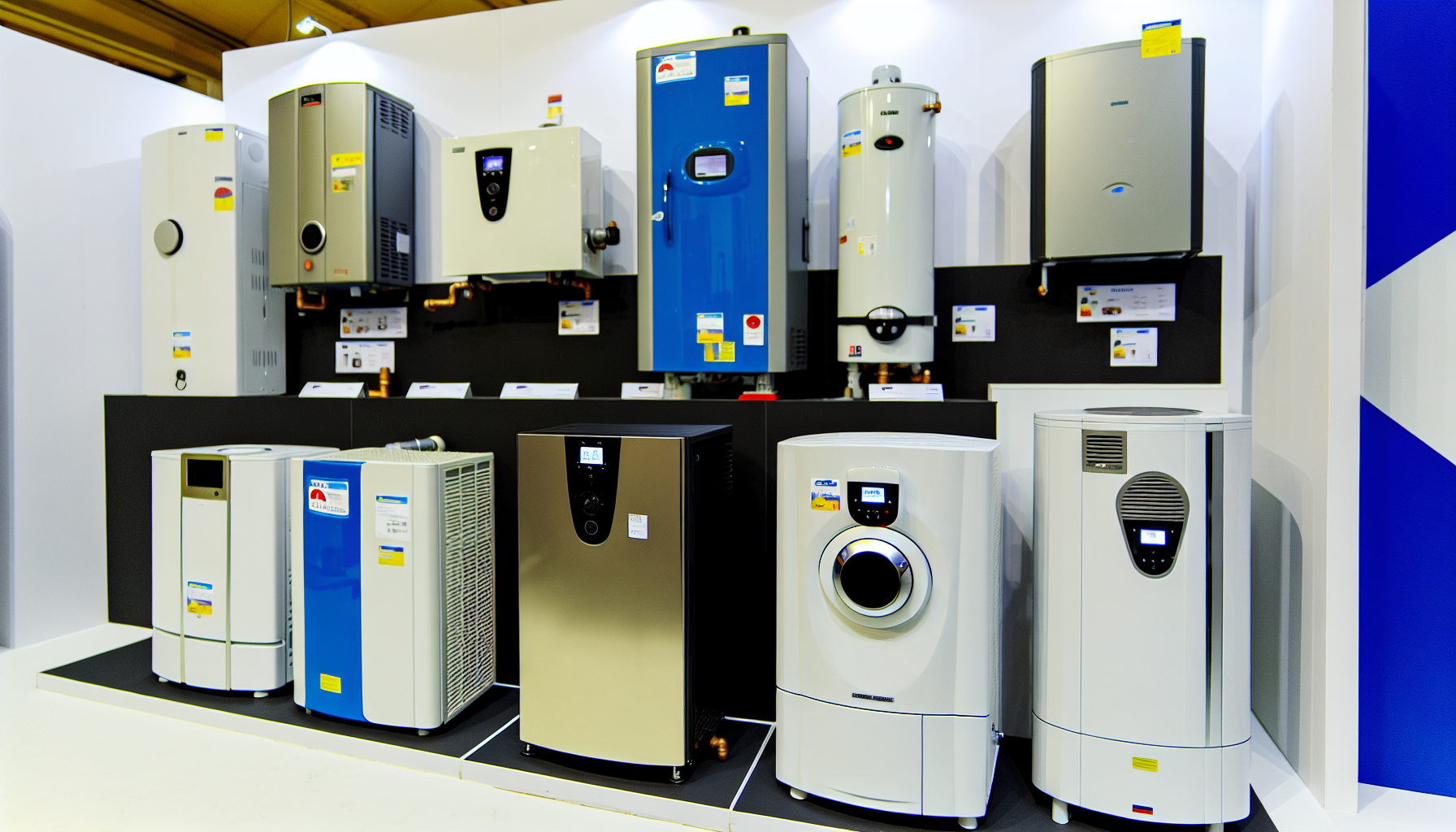
The process of selecting the appropriate heat pump hot water system extends beyond merely choosing a reliable brand. It also requires understanding the differences between integrated and split systems, determining the right size for your home, and considering the noise level of the system. Each of these factors contributes significantly to the system operating efficiently and fulfilling your hot water needs.
It should also be noted that the optimal choice can significantly differ based on each household’s specific circumstances. For example:
-
A larger home with higher hot water needs may benefit from a larger, split system
-
A smaller home might be better served by a compact, integrated system
-
Noise-sensitive households might opt for a quieter model or install their system in a location where noise won’t be a disturbance.
Integrated vs. Split Systems
When selecting a heat pump hot water system, one of the first decisions you’ll need to make is whether to choose an integrated or split system. Integrated systems combine all the heat pump components with the tank in a single unit, making for a compact and simpler installation process. On the other hand, split systems house the heat pump component in a separate unit, much like a split system air-conditioner. This arrangement offers more flexibility in installation, especially in tight spaces or when the system needs to be placed far away from the hot water faucets.
While integrated systems are generally more cost-effective and easier to install, they lack the adaptability of split systems. Split systems can be customized to fit specific spaces and situations, but they may have a higher initial cost compared to integrated systems. Ultimately, the choice between integrated and split systems will depend on your specific needs and circumstances.
Sizing Your Heat Pump System
After deciding between an integrated and split system, the next step is to determine the right size for your heat pump system. The size of a heat pump hot water system plays a crucial role in determining its hot water production capacity and efficiency. Selecting the appropriate size can result in enhanced efficiency and potential long-term cost savings.
A professional can be advantageous in ensuring the selection of a system that effectively meets hot water requirements while optimizing energy usage and cost efficiency. The relationship between heat pump size and household hot water demand is influenced by factors such as:
-
showering length and patterns
-
household size
-
climate
-
insulation
Sizing is often based on generous assumptions, which can result in larger tanks than necessary. In addition to household size, factors such as climate and insulation can also have an impact on the choice of a heat pump hot water system.
Noise Level Considerations
Despite often being overlooked, noise level is a critical consideration when choosing a heat pump hot water system. Although these systems are generally quiet, certain models may produce more noise than others, which could impact the quality of your living environment. Noise levels for typical heat pump hot water systems can vary from 38 dBA to 51 dBA.
The placement of the heat pump hot water system can also have an impact on its noise level. Installing the system near the hot water faucets and indoors, for example, in a plant room, can contribute to reducing the noise level. It’s important to consider noise levels when deciding on the placement of the system to prevent disturbances, especially during nighttime.
Installation and Maintenance Tips
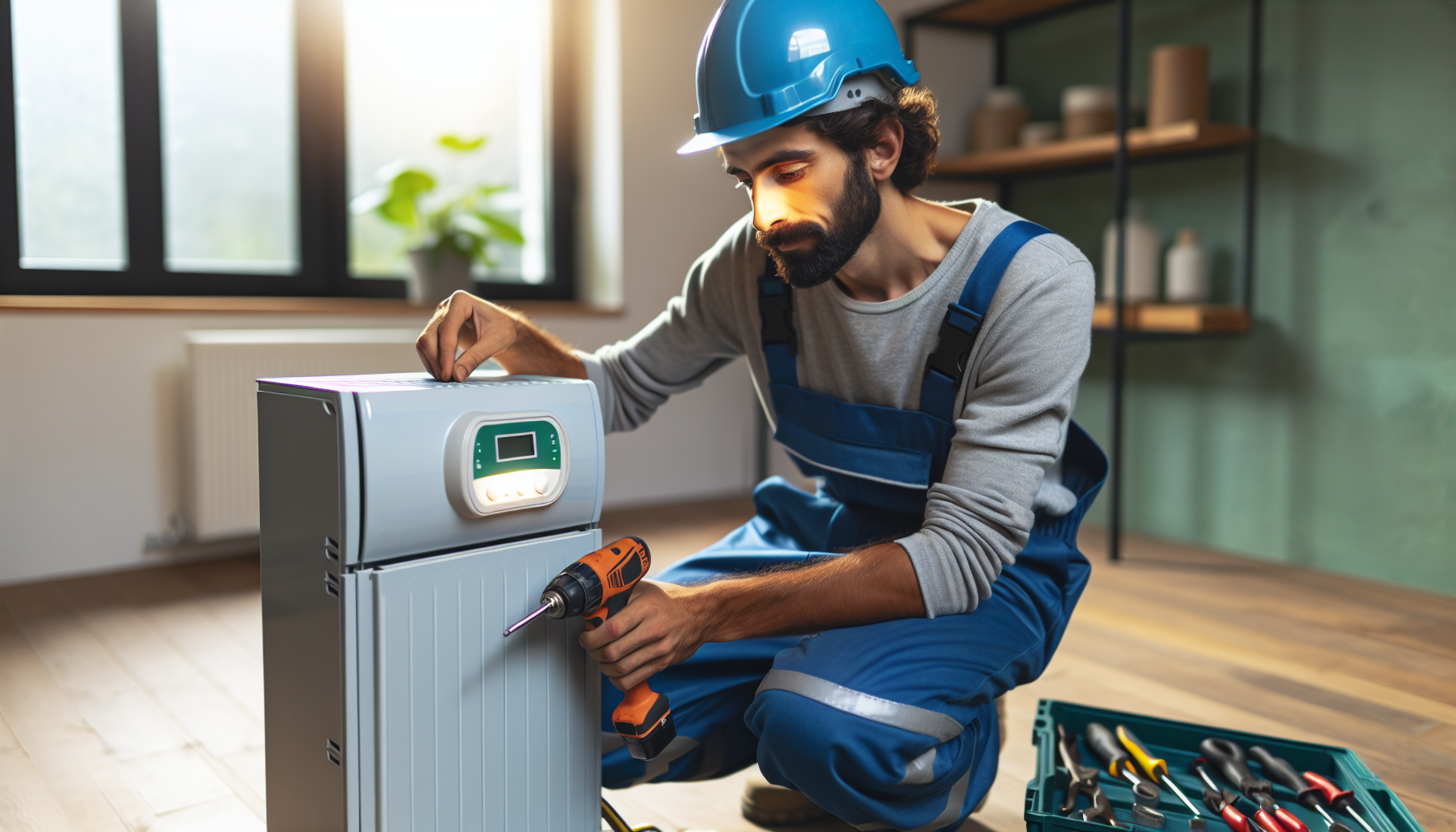
Once you’ve chosen the right heat pump hot water system for your needs, the next step is installation. One must remember, for optimal performance and longevity, these systems should be installed by a certified professional. Proper installation and regular maintenance can significantly enhance the energy efficiency of a heat pump hot water system, leading to potential savings on energy costs and prolonging the system’s lifespan.
In addition to professional installation, periodic maintenance of your heat pump hot water system is also of paramount importance. Regular maintenance can greatly prolong the system’s lifespan and reduce the impact on its efficiency. This includes tasks like cleaning or replacing air filters, checking for refrigerant leaks, and inspecting the thermostat.
Professional Installation
Professional installation of your heat pump hot water system is indispensable for optimal performance and energy efficiency. Professional installers have the necessary qualifications and experience in accurately sizing and installing hot water systems. The installation process includes:
-
Removing the existing heater
-
Conducting cleanup
-
Preparing the plumbing
-
Positioning the hybrid water heater
-
Connecting water pipes
-
Addressing condensate
While it might be tempting to attempt a DIY installation, especially for those with some technical skills, it’s important to remember that improper installation can lead to decreased efficiency and potential damage to the system. Moreover, professional installation often comes with a warranty, providing peace of mind and protection for your investment.
Periodic Maintenance
Regular maintenance tasks are vital for the optimal performance and longevity of a heat pump hot water system. These include inspections, cleaning or replacing air filters, checking for refrigerant leaks, cleaning the coils, inspecting the thermostat, maintaining clearance, and checking the condensate drain line for dirt and debris. It’s also important to keep the outdoor unit clear of snow, ice, and debris, and trim shrubs to ensure proper airflow.
Professional inspections should be scheduled regularly, and the anode rod checked. The sacrificial anode rod should be replaced at least every 5 years. Regular maintenance can greatly prolong the system’s lifespan and reduce the impact on its efficiency. The specific maintenance recommendations can be located in the owner’s manual of the heat pump water heating system.
Troubleshooting Common Issues
Despite heat pump hot water systems’ general reliability, they can occasionally encounter problems. Common issues include:
-
Water leakage
-
Insufficient hot water
-
Electrical malfunctions
-
Unusual noises
-
Odorous or discolored water
Understanding these issues can help you identify and resolve problems early on, preventing further damage and extending the lifespan of the system.
If you notice any of the following issues with your system, it’s a good idea to call a professional for an inspection:
-
Unusual noises, such as banging or rattling sounds
-
Persistent leaks
-
Visible corrosion
-
Unpleasant smells
-
Water discoloration
-
Unpredictable water temperature variations
-
Rusty or dirty water
These could be signs of loose valves, refrigerant leaks, foreign objects or loose components, or other problems with your system.
Financial Benefits and Incentives
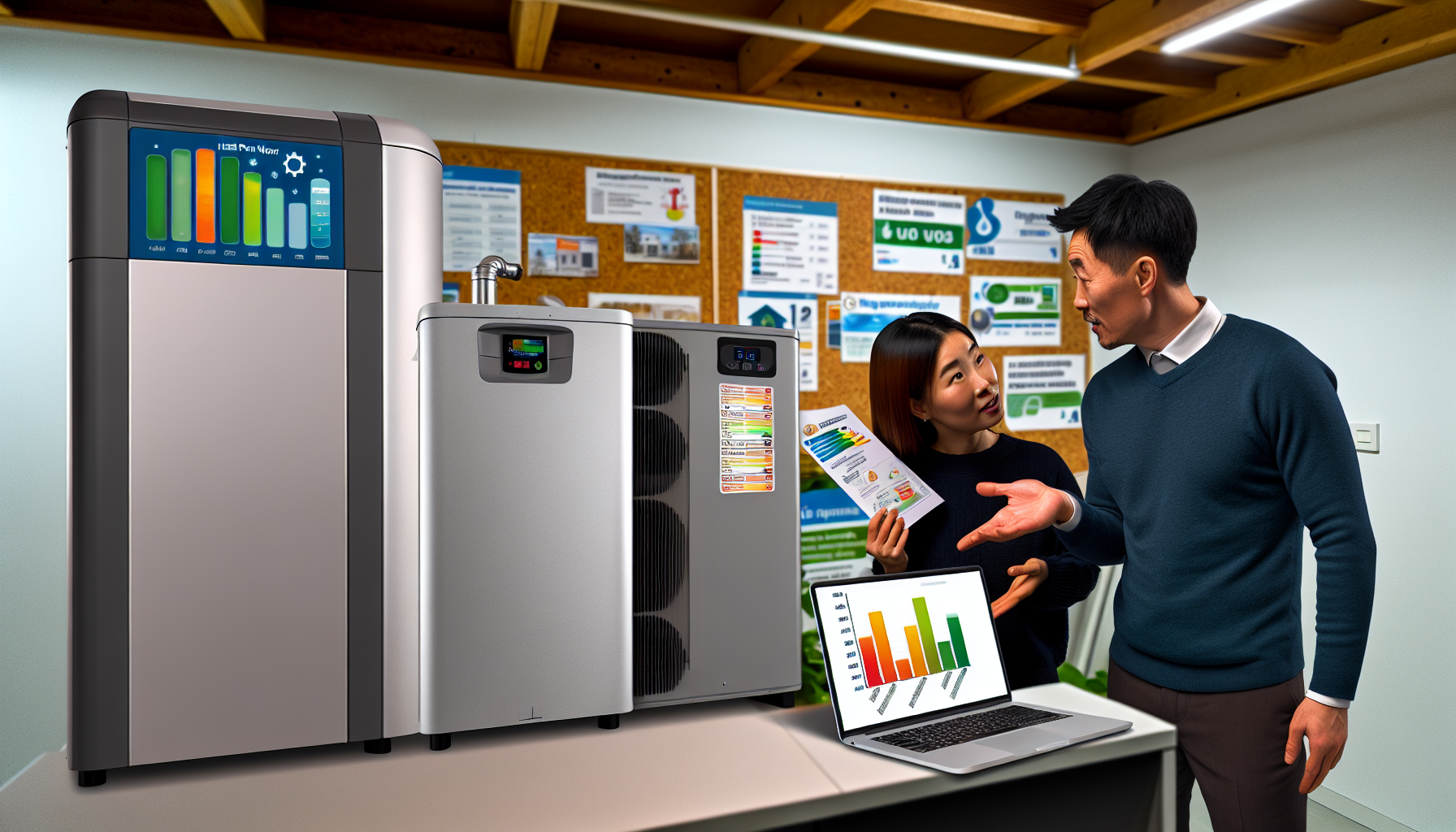
Heat pump hot water systems, also known as hot water heat pumps or heat pump water heaters, may entail higher initial costs compared to traditional gas or electric hot water systems, but the long-term financial returns are substantial. Thanks to their exceptional energy efficiency, these systems can result in reduced energy expenses over an extended period. In fact, transitioning to a heat pump hot water system has the potential to yield substantial cost savings on energy bills, typically falling within the range of 50% to 80%.
In addition to these long-term savings, there are also government incentives and discounts available for eligible households installing or replacing heat pump hot water systems. These incentives can help offset the initial cost of the system, making it an even more cost-effective choice in the long run.
Long-term Savings
The long-term savings that heat pump hot water systems offer is one of their significant advantages. By utilizing only about 30% of the energy required by a conventional electric hot water system, heat pumps can significantly reduce your monthly energy bills. These systems demonstrate higher energy efficiency than a traditional water heater by consuming significantly less electricity.
Solar hot water systems generally incur an estimated annual cost of $120 to $150, whereas most heat pump alternatives typically amount to around $200 to $300 per year. This represents a substantial reduction in comparison to the operational costs of traditional water heaters. The timeframe for recouping the initial investment of a heat pump hot water system varies, with reduced monthly energy bills and maintenance costs playing a significant role in accelerating the realization of these savings.
Government Incentives and Discounts
The initial cost of installing a heat pump hot water system can be significantly reduced by government incentives and discounts. Eligible households can avail these incentives, making the transition to a more energy-efficient hot water system more cost-effective.
To qualify for government incentives for heat pump systems, individuals must have a combined household income of less than $180,000 per annum before tax. There may be additional specific requirements for commercial installations. These incentives can result in significant savings on the initial cost of a heat pump system, making it a more feasible option for many households.
Maximizing Energy Efficiency with Renewable Energy Sources
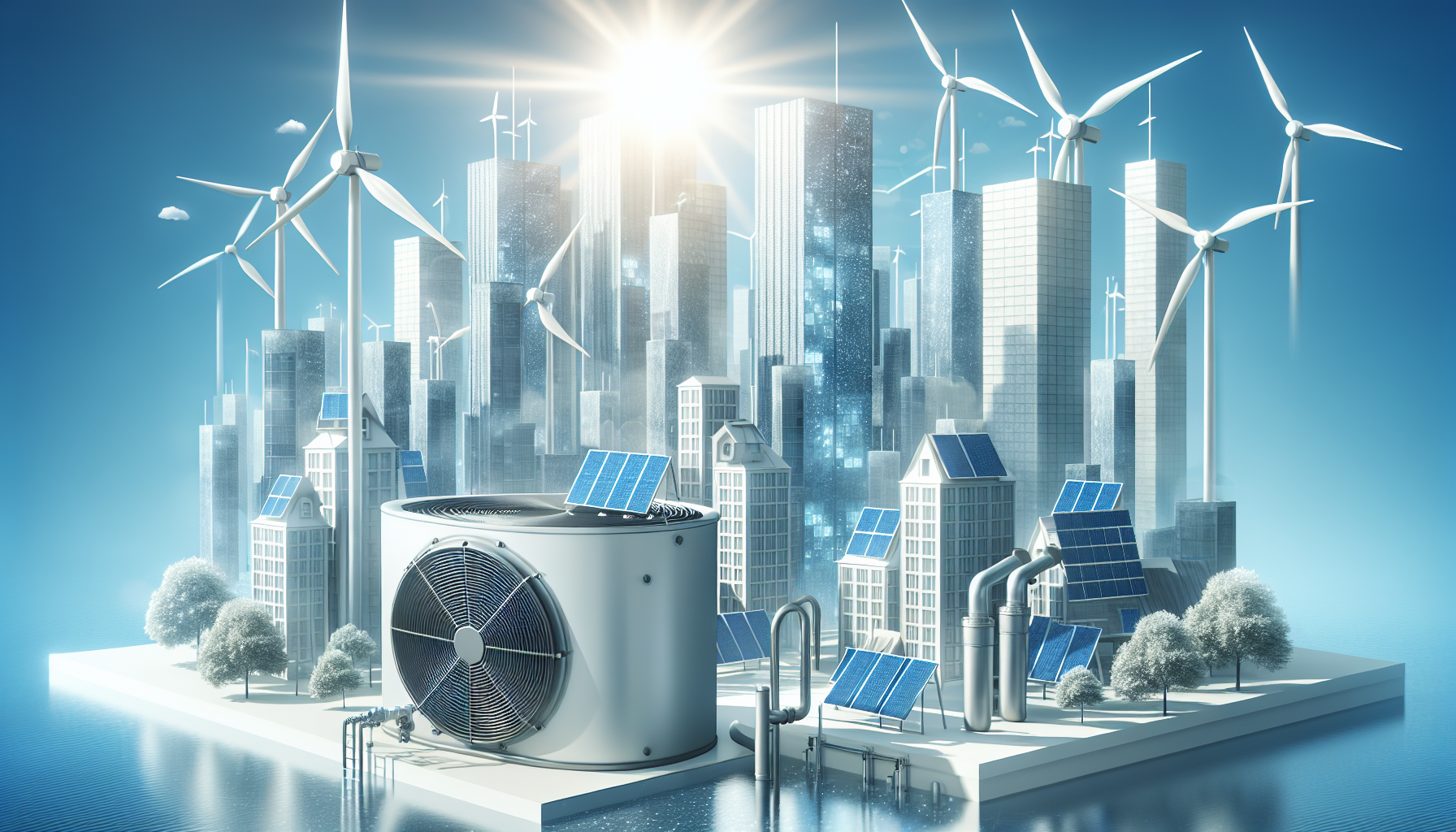
Integrating renewable energy sources can further boost the efficiency and cost-effectiveness of heat pump hot water systems, which are already highly energy-efficient. Utilizing renewable energy sources such as solar PV systems and off-peak electricity tariffs can provide additional energy savings and reduce reliance on grid electricity.
Solar PV integration entails combining a heat pump and a solar energy system to establish a sustainable source of hot water. Meanwhile, off-peak electricity tariffs offer a discounted electricity rate during times of reduced electricity demand, which can be advantageous for heat pump hot water systems as it enables them to heat water at a lower cost during off-peak periods.
Solar PV Integration
Integrating a solar PV system with a heat pump hot water system can provide a sustainable and efficient source of hot water. A solar PV system, also referred to as a photovoltaic system, is designed to directly convert sunlight into electricity through the use of solar cells. By combining this with a heat pump system, homeowners can leverage solar energy to reduce their reliance on grid electricity, leading to further energy savings.
However, integrating a solar PV system with a heat pump hot water system may present potential challenges such as system control issues and the need to address operational challenges. Despite these challenges, PV water heating is technically appealing as it can overcome traditional control issues, and PV systems have lower solar radiation requirements.
Off-Peak Electricity Tariffs
Off-peak electricity tariffs provide reduced electricity prices during periods of lower demand, typically occurring at night or on weekends. Homeowners can capitalize on lower electricity rates by:
-
Operating heat pump systems during off-peak hours
-
Taking advantage of time-of-use pricing plans
-
Using programmable thermostats to schedule heating and cooling cycles during off-peak hours
This can lead to significant cost savings and reduced electricity expenses.
Off-peak hours for electricity are generally scheduled during nighttime or weekends, and the specific timing, such as 10pm to 7am daily, varies based on the location and the type of electricity meter in place. Heat pump systems have the capability to leverage off-peak electricity tariffs by either heating water during peak usage times or utilizing colder outdoor temperatures at night, which can coincide with lower electricity rates.
Summary
In summary, heat pump hot water systems represent a significant advancement in the quest for energy efficiency. Their operation, which involves extracting heat from the ambient air and using it to heat water, allows for significantly higher energy efficiency compared to traditional water heaters. Choosing the right system involves considering factors such as integrated vs split systems, system size, and noise levels. Proper installation and regular maintenance are crucial for optimal performance and longevity of the system.
The financial benefits of heat pump hot water systems are significant, with potential long-term savings on energy bills and government incentives available for eligible households. Maximizing energy efficiency with renewable energy sources, such as solar PV integration and off-peak electricity tariffs, can further enhance the benefits of these systems. With all these advantages, it’s clear that heat pump hot water systems are a smart choice for anyone seeking to reduce their energy consumption, save money, and do their part for the environment.
Frequently Asked Questions
Is it worth getting a heat pump hot water system?
Yes, it's worth getting a heat pump hot water system for the savings, energy efficiency, and easy conversion from your current heating system.
What are the disadvantages of a heat pump hot water system?
In conclusion, the disadvantages of a heat pump hot water system include higher upfront costs, potential limitations in colder climates, and the possible need for a backup heating source during periods of high hot water demand.
Can you run out of hot water with a heat pump?
Yes, you can run out of hot water with a heat pump if the tank is too small for the number of people using the system and their water use patterns. It's important to choose the right size to avoid running out of hot water.
How much does a heat pump hot water system cost?
A heat pump hot water system can cost anywhere from $2500 for a 200L tank to $4500 for a 400L tank, with the average cost for a 250L system being around $3250. Keep in mind that a well-maintained, quality system can last for more than 10 years.
What are the main components of a heat pump hot water system?
The main components of a heat pump hot water system include the evaporator, fan, compressor, and refrigerant piping. These components work together to draw heat directly from the ambient air.






















